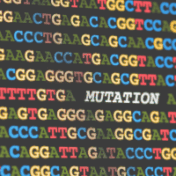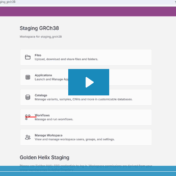High-quality copy number variant (CNV) analysis begins with a well-designed assay and optimized sequencing workflow. Foundational quality measures deployed in VarSeq include building an appropriate reference set for coverage normalization, ensuring sufficient sequencing depth, and maintaining consistency in both the sequencing platform and library preparation methods. These steps help ensure robust data and reliable CNV detection. However, additional post-project refinement… Read more »
As a new member of Golden Helix’s Field Application Services team, I’ve recently been diving into the capabilities of VarSeq and our broader software suite – an experience every new VarSeq user goes through. If I could schedule a training call with my former self, there are some key points I’d share to help hit the ground running. Here are… Read more »
Over the past several months, we’ve highlighted the powerful new capabilities introduced with VarSeq Warehouse 3.0. Today, I’d like to focus on a familiar feature that’s been thoughtfully enhanced, assessment catalog record management. This update significantly improves data quality, role-based collaboration, and regulatory compliance. Variant assessment catalogs have always been a core component of the VarSeq platform, allowing users to… Read more »
As next-generation sequencing (NGS) becomes more embedded in clinical diagnostics and research workflows, the ability to confidently interpret and report on genomic findings is more critical than ever. In July 2025, Golden Helix’s software suite continued to play a central role in variant annotation and classification, with publications spanning diverse clinical contexts, from population-wide secondary findings to rare disease diagnostics… Read more »
Managing long‑read secondary analysis used to mean wrestling with Cromwell servers, custom compute nodes, and a tangle of WDL files. VSWarehouse 3 removes that burden. Drop your PacBio output into a watched folder, and our platform does the rest: spinning up compute, tracking every task, and handing you fully annotated results ready for clinical interpretation. Built‑In Workflows, Ready to Launch To… Read more »
In our recent webcast, we explored how VSWarehouse 3 streamlines and automates pharmacogenomics workflows, transforming raw NGS data into actionable clinical reports. This blog post recaps the webcast, breaking down each component of the standard pharmacogenomics workflows to demonstrate how laboratories can achieve end-to-end automation in pharmacogenomic (PGx) testing. Breaking Down the Pharmacogenomics Workflow VSWarehouse 3 provides users with an… Read more »
A crucial step in any next-generation sequencing (NGS) analysis is quality control, which is essential for confirming the validity of potentially clinically relevant findings before proceeding with any subsequent variant interpretation or reporting. While Golden Helix does not directly provide NGS validation services, our VarSeq software provides robust analysis tools that can help users perform their own quality control (QC)… Read more »
In the world of genomics, data ownership and portability are fundamental principles that every researcher and clinician should embrace. With the increasing complexity of genomic datasets and the critical importance of long-term data accessibility, having the ability to export your data in multiple formats is not just convenient, it’s essential. This is where the gautil export commands shine, providing researchers… Read more »
This year, our CancerKB curation team has been hard at work expanding and refining the content that supports cancer variant interpretation and clinical reporting. In addition to staying current with the latest FDA-approved therapies and NCCN Guideline-recommended treatments, the team has taken on a significant new initiative: developing comprehensive diagnostic and prognostic interpretation summaries for the most prominent solid tumors…. Read more »
At Golden Helix, we’ve supported the HGVS variant nomenclature standard since the very first release of VarSeq. The HGVS standard provides a consistent and precise language for describing sequence variants in the context of gene transcripts and is a critical part of clinical genomics workflows. As with all living standards, HGVS continues to evolve, refining how we describe increasingly complex… Read more »
New to VarSeq 3 is support for breakend catalogs. Breakends represent the junction points of structural variants, which include complex genomic rearrangements like translocations, inversions, and large deletions that play crucial roles in cancer genomics and rare disease analysis. These catalogs are unique as they must save two genomic positions for each record, representing both sides of the structural variant… Read more »
This month, our team at Golden Helix is proud to highlight a series of standout customer publications demonstrating the real-world impact of next-generation sequencing and variant analysis. Featured articles from June 2025 showcase the power of the VarSeq platform in supporting high-quality research across hereditary and somatic disease. From integrating AI to enhance variant detection in colorectal cancer, to reclassifying… Read more »
Managing genomic workflows at scale has always required a bit of IT expertise. The reality is, Next Generation Sequencing data is quite large and requires substantial compute resources to process. Clinical labs must carefully plan how to scale their IT resources to match their genomic testing workloads. Some labs prefer to operate fully “cloud native,” while others value the control… Read more »
We’re excited to announce a powerful new feature in GenomeBrowse that enhances our support for visualizing long-read sequencing data: the ability to color reads by base modifications, such as DNA methylation, directly from BAM and CRAM alignment files. Long-read sequencing technologies like those from PacBio and Oxford Nanopore have unlocked the potential to directly detect base modifications, including cytosine methylation… Read more »
Here at Golden Helix, we continue to develop top-quality bioinformatic software to support high-throughput clinical next-gen sequencing pipelines, including long-read whole-genome-sequencing (WGS) workflows. WGS long-read technologies like PacBio HiFi and Oxford Nanopore offer improved variant calling for SNVs, Indels, structural variants, tandem repeats and repeat expansions, and epigenetic modifications. Each of these genetic variations that are detected using long-read WGS… Read more »
As comprehensive genomic profiling (CGP) becomes the standard in cancer variant analysis, the scale and complexity of next-generation sequencing (NGS) data continue to grow. It is now commonplace to report on small variants, larger amplifications and deletions, various complex structural variants (fusions or breakends) as well as genomic signatures like microsatellite instability (MSI) and tumor mutation burden (TMB). Interpreting this… Read more »
Next-generation sequencing (NGS) data analysis often involves multiple steps from variant annotation, filtering, interpretation, visualization, and report generation. Repeating these steps manually for each new project can be error-prone and inefficient. In clinical and regulated environments, we recognize that consistency is critical. That’s why VarSeq offers robust support for workflow templates, enabling users to save, share, and reuse entire analysis… Read more »
Calling all creatives, scientists, and fans of clever wordplay: Golden Helix is thrilled to kick-off the 2025 T-Shirt Design Competition! As we gear up for another exciting conference season, we want to see your witty ideas, genetics puns, and eye-catching graphics. This year’s winning designs will be unveiled at the upcoming ASHG 2025 conference and displayed worldwide at all upcoming… Read more »
Modern genomics workflows often require multiple specialized tools working in concert. In the upcoming VarSeq release, we are excited to announce the option for tighter integration with IGV. Genomics researchers and clinicians are well-versed in using IGV as a visualization tool for their genomic data. This new option will allow for synchronizing the view in the Golden Helix GenomeBrowser with… Read more »
Long-read sequencing technologies have opened new doors in genomics research, enabling more comprehensive analysis of structural variants, phasing, and complex genomic regions. To support these powerful applications, we’ve introduced several new features to GenomeBrowse that specifically enhance the visualization of long-read alignment files. These improvements are designed to help our users extract meaningful insights from their data while minimizing visual… Read more »



















